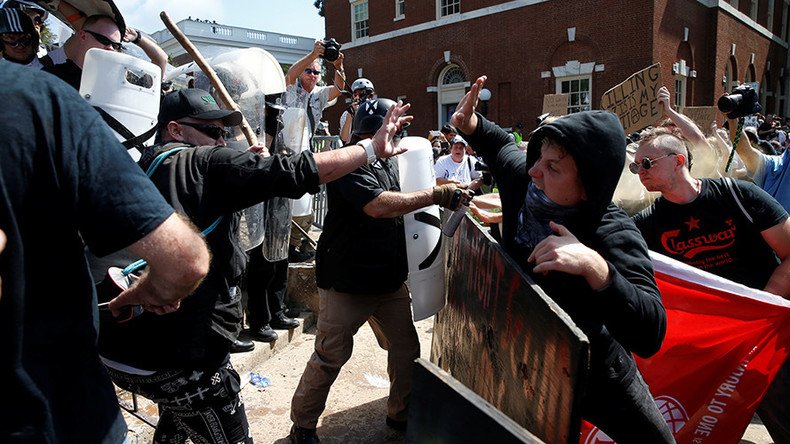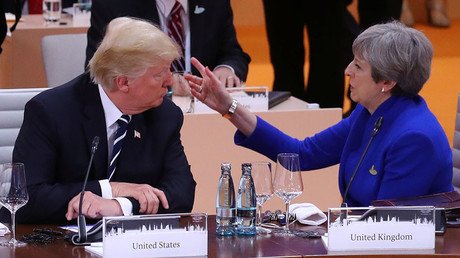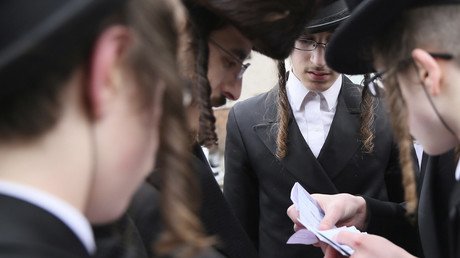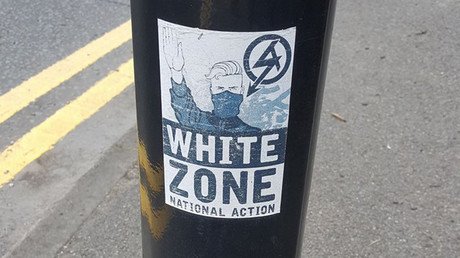Far-right BNP says Britain should brace itself for Charlottesville-style clashes

Violent clashes between white supremacists and anti-fascist groups like those seen in Charlottesville, Virginia, are bound to break out in the UK, according to the far-right British National Party (BNP).
A young woman was killed and 19 protesters injured last week when a car was plowed into anti-fascist protesters opposing Saturday’s ‘Unite the Right’ demonstration. A state of emergency was imposed as rival group of protesters clashed in the streets.
US President Donald Trump has been criticized for focusing on the violence committed by both sides rather than condemning outright the far-right, neo-Nazi, and white supremacist elements involved.
Speaking to RT, David Furness, Britain’s far-right BNP press officer, seemed to echo the president’s analysis. He claimed that similar events are likely to occur in the UK because far-right groups are being deprived of their right to freedom of speech by “violent” left-wingers.
Furness' remarks come as a new YouGov poll reveals that 43 percent of Britons believe the US protests could be repeated in the UK. By contrast, just 10 percent say such clashes could never happen here.
The BNP enjoyed some successes in local elections during the 2000s, only to almost vanish after failing to make gains in the 2010 general election. Their support base has largely drifted to parties like UKIP and Britain First.
Furness' argues the far-right protesters in Charlottesville, who were demonstrating against the removal of a statue of Confederate General Robert E. Lee, had the “legal right” to voice their opinions, while counter-demonstrators had “no permission” to intervene.
Conceding that free speech “may offend” some people, Furness' said right-wing protesters have a “right to be heard, but they don’t have a right to be attacked by the far-left.”
“Most of the political violence comes from the left, here and America.
“The left is upset that people have a different point of view and they can’t accept it, they think their way is the only way, and that all opposition should be crushed.”
The Sunday Times recently reported that around 40 suspected Nazis are under police investigation in the UK amid fears they are plotting terrorist attacks against Muslims.
It comes against a backdrop of rising hate crime, particularly against Muslims.
Police forces across England and Wales noted a rise of almost 100 percent in the months following the EU referendum in June last year.
According to figures released by London Mayor Sadiq Khan in June, the number of anti-Muslim hate crimes in the British capital rose fivefold in the aftermath of three separate terrorist attacks in four months.
London was also struck by a suspected far-right terrorist attack targeting Muslim worshippers in Finsbury Park, which left one person dead when a van plowed into a crowd.
‘Crushing democracy’
Unite Against Fascism (UAF) national campaigner, Weyman Bennett hit out at the BNP’s claim that the left is the main driver of violence.
A far-right group which “admires Adolf Hitler” should not be given any platform, he said.
“Far-right, extremely violent groups, clearly need to be opposed by all who detest [them], both from the streets and electorally when they pop up,” he told RT.
The UAF campaigner said neo-Nazis aim to “smash democracy.” Their actions are therefore “not equivalent to any political party.”
Media inciting Islamophobia
Although far-right groups in the UK are “small and fragmented” compared to those in the US, Bennett warned there is a danger of Islamophobia spreading across the country because of anti-Muslim “propaganda” in politics and the media, which “emboldens people to perpetuate horrendous attacks.”
This echoes comments made by Muslim British Council (MBC) leader Miqdaad Versi, who told RT it is “shocking” that such Islamophobic views are pushed by mainstream media outlets.
Versi singled out a column in the Sun on Sunday, which claimed Britain has a “Muslim problem.”
He also hit out at columnist Katie Hopkins, who tweeted in the immediate aftermath of the Manchester Arena bombing in May that the country needs a “final solution” to tackle Islamists. The phrase is synonymous with the Nazi’s ‘Final Solution’ policy to exterminate Europe’s Jews.
Although many find far-right views “appalling,” Versi claimed there are large sections of the community in which Islamophobia is becoming “acceptable.”
The MBC leader said they pose a “real threat.”















